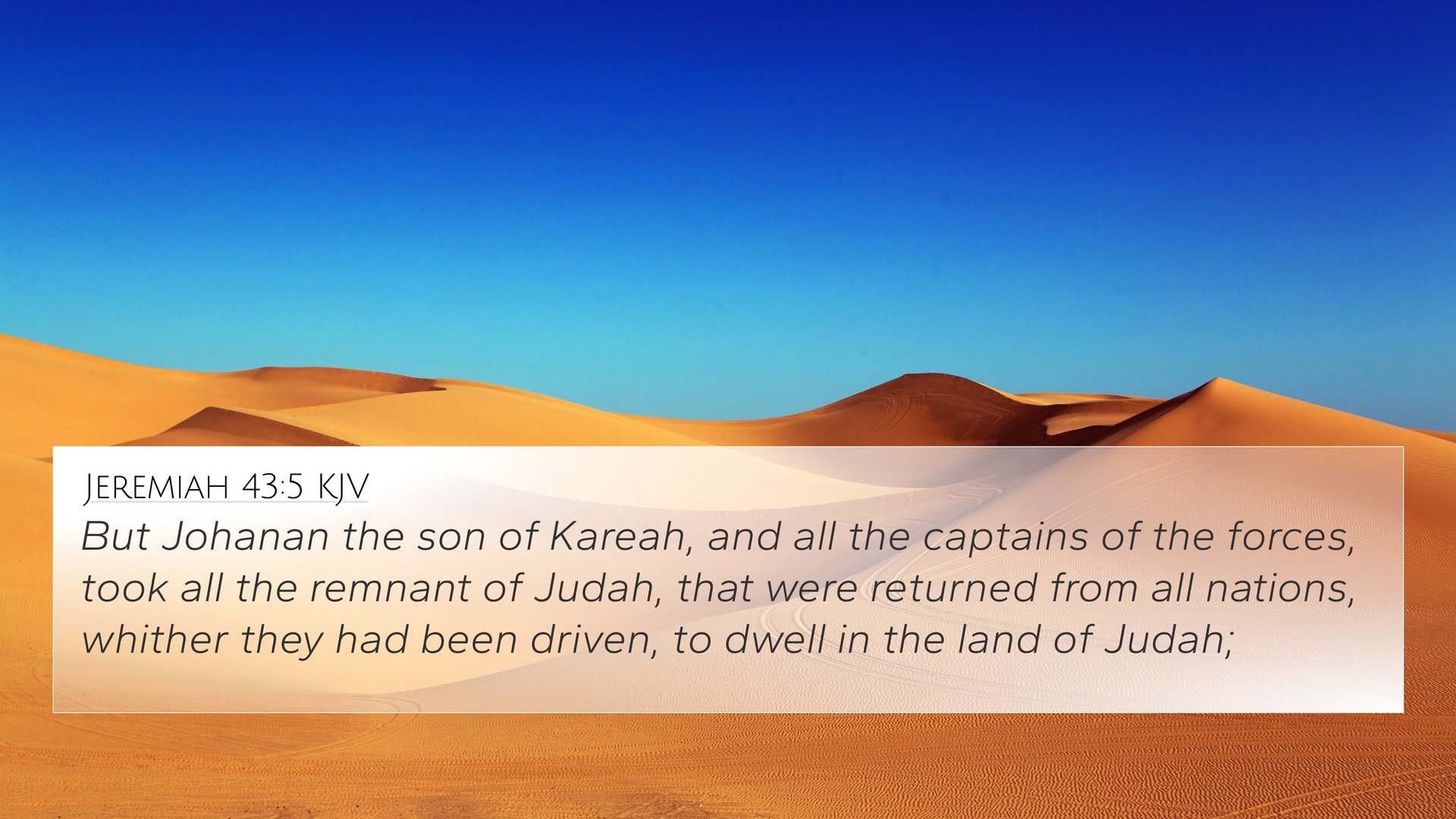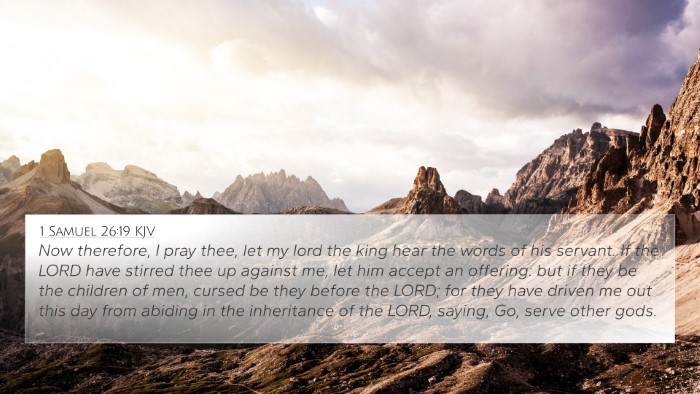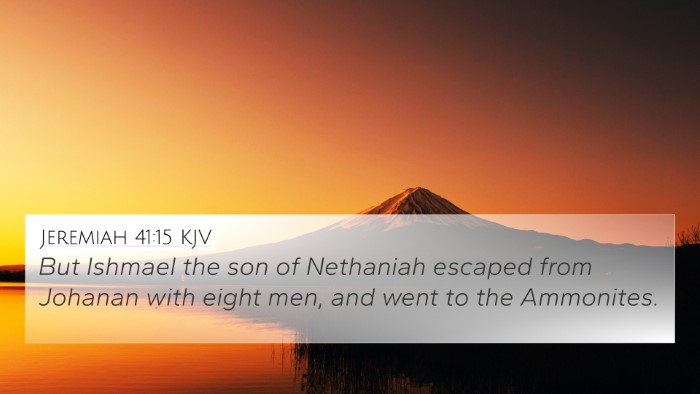Understanding Jeremiah 43:5
Jeremiah 43:5 states: "But Johanan the son of Kareah, and all the captains of the forces, took all the remnant of Judah, that were returned from all nations whither they had been driven, to dwell in the land of Judah." This verse captures a moment of significant historical and prophetic weight, reflecting the aftermath of the Babylonian exile and the complex dynamics of leadership and obedience among the remnants of Judah.
Contextual Background
The context of Jeremiah 43 arises during a tumultuous period when the people of Judah were grappling with their identity and fate after the fall of Jerusalem. The Prophet Jeremiah had warned them against fleeing to Egypt for refuge, but the captains, led by Johanan, defied his counsel. This reflects a broader theme within Scripture of God's guidance versus human inclination towards self-preservation.
Insights from Public Domain Commentaries
-
Matthew Henry:
Henry emphasizes the disobedience of Johanan and the captains, highlighting how they took matters into their own hands. He notes that their decision to flee not only reflects a lack of faith in God's promises but also serves as a parallel to earlier disobediences seen throughout biblical history.
-
Albert Barnes:
Barnes points out that this action signifies the failure of the people to heed divine warnings. He explores how Johanan's leadership leads them into Egypt, representing a deeper spiritual danger of abandoning trust in God's plans.
-
Adam Clarke:
Clarke discusses the implications of this flight to Egypt, which represents both physical and spiritual defection from God's will. He elaborates on the themes of sovereignty and human agency, suggesting that the remnants' choices impact their relationship with God.
Thematic Connections in Scripture
This verse provides rich thematic connections with various other scriptural passages, enriching the understanding of God's overarching narrative. Here are several related verses:
- Jeremiah 42:1-3: The request of the people for guidance from Jeremiah emphasizes their initial acknowledgment of God’s word.
- Jeremiah 44:1-14: A continuation of the discussion about the fate of those who flee to Egypt reveals God’s judgment on their disobedience.
- Isaiah 30:1-2: A prophetic warning against seeking help from Egypt instead of relying on God.
- 2 Kings 25:26: Highlights the aftermath of the Babylonian captivity and the fear that drives the leaders’ choices.
- Exodus 14:11-12: A historical reflection on Israel’s escape from Egypt, drawing parallels to present choices of the remnant.
- Psalms 118:8-9: Emphasizes the futility of trusting in man versus seeking refuge in the Lord.
- Proverbs 3:5-6: Encourages trust in God rather than in one’s own understanding, which echoes the concern of disobedience in Jeremiah 43:5.
- Romans 8:28: Reminds believers that God works for the good of those who love Him, a call to trust divine purposes.
- Hebrews 11:32-40: References the faith of the ancients and their experiences, suggesting that the remnant's choices could reflect a lack of such faith.
- Acts 3:19-21: Highlights the need for repentance and the anticipation of restoration, mirroring the hope Jeremiah offers amidst despair.
Cross-Referencing Biblical Texts
Cross-referencing offers a profound way to understand the interconnections and themes that arise in biblical texts. The act of examining Bible verses that relate to each other not only aids in deepening comprehension but also enhances personal application of scripture. Below are methods for effective cross-referencing:
-
Utilize a Bible Concordance:
This tool helps locate Bible verses based on specific keywords and themes, allowing readers to see connections across scripture.
-
Employ a Cross-Reference Bible Study Guide:
These guides provide structured approaches to finding themes and parallels, aiding in deeper analysis.
-
Explore Cross-Reference Bible Chains:
This method links verses that have thematic connections, enabling easier exploration of intertwined biblical messages.
-
Identify connections between the Old and New Testament:
Thematic studies can reveal how prophetic messages in the Old Testament find their fulfillment or echo in the New Testament.
-
Develop a Comparative Bible Verse Analysis:
By studying similar verses side by side, one can gain insights into the nuances and broader implications of scriptural teachings.
User-Intent Queries on Cross-Referencing
Many seekers of scripture find themselves asking:
- What verses are related to Jeremiah 43:5? This understanding can broaden their grasp of God’s message and the very human reactions observed in the biblical narrative.
- How do Jeremiah 43:5 and Jeremiah 42:1-3 connect? This inquiry leads to a deeper exploration of the remnant's choices and the prophetic warnings issued.
- Similarities between Jeremiah 43:5 and Isaiah 30:1-2? This reflection can unveil a pattern of reliance on worldly powers instead of divine direction.
- Bible verses that support the themes found in Jeremiah 43:5? Exploring verses from Proverbs and Psalms provides foundational wisdom contrasting human action with divine will.
Final Thoughts
Jeremiah 43:5 serves as a transformative verse that not only chronicles a historical narrative but also evokes critical reflections on faith, obedience, and the consequences of spiritual choices. It invites an exploration of connections between Bible verses while enhancing the understanding of God's faithfulness, even in moments of human folly. Engaging with such scriptures through cross-referencing paves the way for profound insights into God's Word and His work throughout history.





